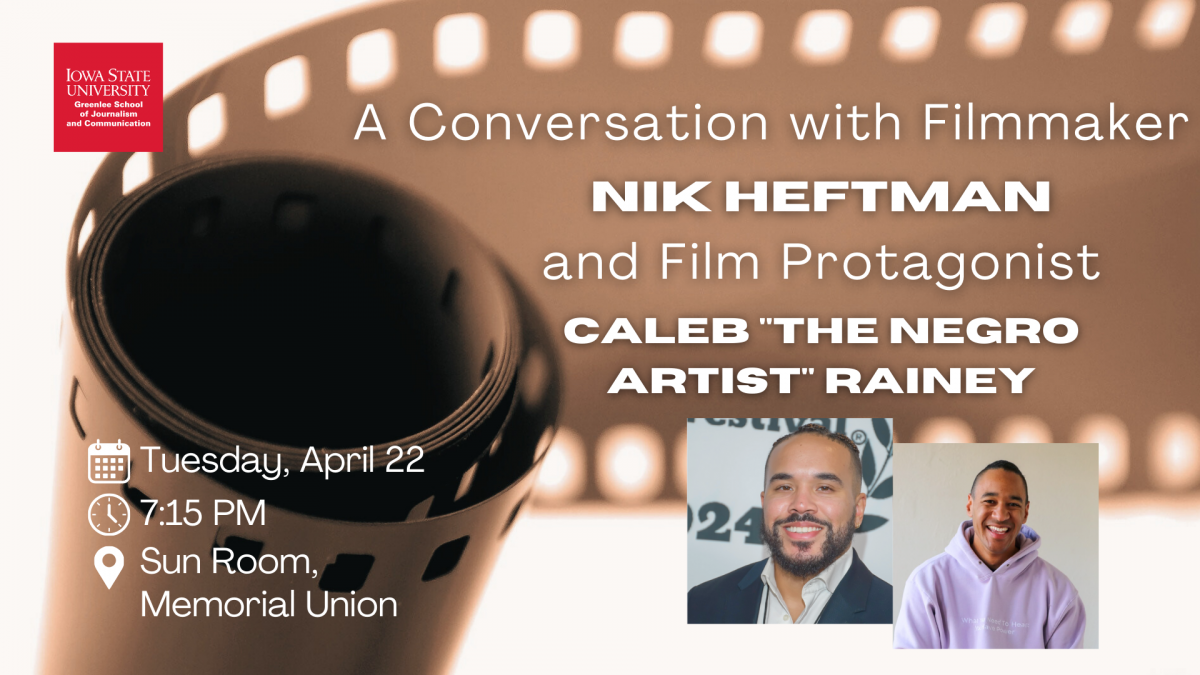Amidst the often-overlooked spaces of the Midwest lives a Black voice that demands to be heard. This documentary is a journey into the world of Caleb Rainey, a Black spoken word poet professionally known as The Negro Artist. Rainey’s poetry is a profound exploration of race, identity and the lived realities of systemic inequality. His stage name is inspired by the Langston Hughes essay “The Negro Artist and the Racial Mountain.” Hughes was an early influence for Rainey as he came into his own as an artist.
“The Negro Artist” documentary screening + Q&A

- Time
-
Tuesday, April 22 2025 to Tuesday, April 22 2025 from 6:00pm to 8:00pm
- Location
Sun Room, Memorial Union
-
Free
This film seeks to capture the essence of Rainey not just as an artist, but as a vital voice in the ongoing dialogue about race in America. His work challenges us to confront uncomfortable truths and inspires us to envision a more equitable future. By sharing Rainey’s story, the hope is to provide a window into the transformative potential of poetry and to affirm the significance of every voice in the ongoing quest for justice and understanding.
—
Greenlee visiting Professional Nik Heftman is the founder and CEO of The Seven Times, a full service video and event production company. The company was founded in 2022 with the goal of spotlighting Black entrepreneurs across the United States. That vision evolved into a weekly docuseries highlighting Black entrepreneurs, artists and other trailblazers who are making tangible, positive impacts in their communities. Heftman produced stories for CBS Mornings in New York City and Los Angeles for more than five years, helping the show earn an Emmy for Outstanding Live News Program. He earned a bachelor’s degree in journalism and mass communications, with a designated area of concentration in international studies, from Iowa State University. He is currently on the advisory board of the Greenlee School of Journalism and Communication.
While at Iowa State, Heftman worked for several local newspapers. His reporting earned him a Mark of Excellence Award from the Society of Professional Journalists for outstanding breaking news reporting. He also received an award from the Iowa Associated Press for a feature he co-wrote on South Sudanese refugees living in rural Iowa. He later was nominated for an SPJ Mark of Excellence Award for feature writing.
Heftman’s dedication to reporting on diversity and inclusion issues earned him the honor of speaking at public forums about the topic, including the Iowa State Conference on Race and Ethnicity (ISCORE) – a comprehensive forum on issues of race and ethnicity at Iowa State University and beyond. Before graduating from Iowa State in 2017, Heftman hosted a blunt debate about the way journalists cover Muslims at home and abroad. The event was called Muslimedia. It was held at a local mosque in Ames. Heftman is also a speaker at the annual Okoboji Writer’s Retreat and a member of the Iowa Writers Collaborative. He also volunteers for Young Storytellers, a nonprofit organization that empowers young people to use the art of storytelling to explore their identities, impact the people around them, and create a more just and equitable world.
Caleb “The Negro Artist” Rainey is an accomplished author, poet, performer and community builder from Columbia, Missouri, holding a B.A. in creative writing from the University of Iowa. Known for his debut book *Look, Black Boy*—an award-winning, bestselling work in African American poetry—Rainey has published multiple books, released spoken word albums, and performed on global stages, ranking 7th in the 2023 UNESCO Slam-O-Vision. He has also acted in plays, produced a short film, and been the subject of a documentary. A tireless advocate for spoken word poetry, Rainey fosters young talent through his program IC Speaks and produces events like the Mic Check Poetry Fest in Iowa City.
This lecture will begin at 7:15 p.m. and will be recorded and ready to view on the Available Recordings page approximately 24-36 hours after the conclusion of the event. The recording will only be available for three weeks from the date of the lecture.
Note: The documentary screening will not be recorded.
